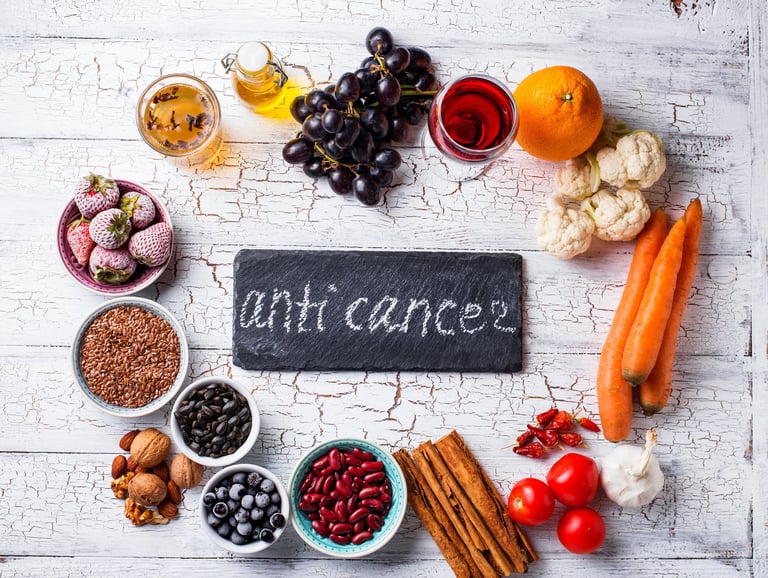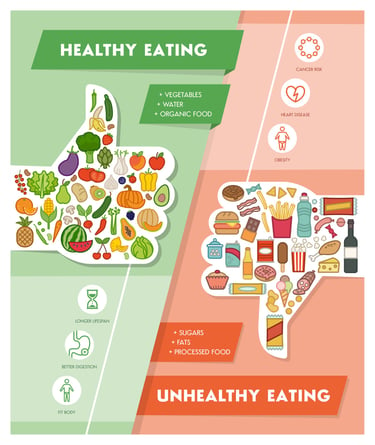Cancer Prevention
21.03.2025
WHAT ARE THE WAYS TO PREVENT CANCER?


Cancer prevention starts with adopting a healthy lifestyle. A balanced and nutritious diet plays an important role in reducing the risk of cancer. It will be beneficial to reduce the consumption of processed and red meat, eat plenty of fruits and vegetables, and include fiber-rich foods in your diet. Regular exercise helps your body stay healthy and maintain your ideal weight. Additionally, avoiding cigarettes and tobacco products and limiting alcohol consumption also reduces the risk of cancer. Avoiding excessive sun exposure and using appropriate sunscreen reduces the risk of skin cancer. In addition, regular health checks and necessary screening tests are vital for early diagnosis. Finally, a healthy environment and clean air are effective in reducing the risk of cancer. Overall, making healthy lifestyle choices is an important step in preventing cancer
The importance of cancer prevention stems from the serious health, economic and emotional impacts this disease can have on both individuals and societies:
Health Effects: Cancer is a life-threatening disease and can be difficult to treat if not detected in the early stages. Treatment processes are often difficult and side effects can be severe. Cancer prevention can help prevent these difficult treatment processes and health problems caused by cancer.
Life quality: Cancer diagnosis and treatment can significantly impact individuals' quality of life. Protection from cancer allows normal life routines to continue and fewer interruptions in work and social activities.
Economic Burden: Cancer treatment can result in high costs for both individuals and healthcare systems. Early diagnosis and screening programs can provide cost savings in healthcare in the long term.
Psychological and Emotional Effects: A cancer diagnosis can have major psychological and emotional impacts on patients and their families. Cancer prevention can help prevent this emotional stress and psychological effects.
Social Impacts: Cancer has widespread effects on society. Factors such as workforce loss, care needs, and use of community health resources increase the impact of cancer on society.
For these reasons, cancer prevention is extremely important not only for individual health, but also for general public health and economy. Making healthy lifestyle choices and getting regular screenings play critical roles in preventing cancer.
Image 1: A healthy and balanced diet helps prevent the development of cancer.


WHAT ARE THE WAYS TO PREVENT CANCER?
Cancer prevention is possible by making healthy lifestyle choices and taking certain precautions. A number of strategies that may help reduce the risk of cancer are listed below:
Avoiding Smoking and Tobacco Use: Smoking and tobacco use are the leading causes of many types of cancer. Staying away from cigarettes and tobacco products can significantly reduce the risk of cancer.
Healthy and Balanced Nutrition: A diet rich in fruits, vegetables, whole grains and lean proteins and low in saturated fats may help reduce the risk of cancer.
Physical Activity: Regular physical activity may reduce the risk of various types of cancer, especially those associated with obesity.
Limiting Alcohol Consumption: Alcohol consumption may increase the risk of some types of cancer, especially liver, breast and colorectal cancers. It is important to limit or quit alcohol consumption.
Sun Protection and Limiting UV Exposure: To protect against skin cancers, it may be useful to use sunscreen creams, limit hours of sun exposure, and wear UV protective clothing.
Cancer Screening Tests: Regular screening can provide early diagnosis and treatment for some types of cancer, such as breast, cervix and colon cancers.
Vaccination: Some types of cancer, especially cervical cancer and some head and neck cancers, are associated with human papillomavirus (HPV). HPV vaccine may reduce the risk of this type of cancer.
Weight Control and Avoiding Obesity: Obesity may increase the risk of some types of cancer. Maintaining a healthy body weight can help reduce this risk.
Limiting Chemical Exposures: Avoiding exposure to harmful chemicals at work or at home is important in preventing occupational cancers.
Using Hormonal Therapies with Caution: Some hormone treatments, especially long-term postmenopausal hormone treatments, may increase the risk of breast cancer. It is important to discuss the risks and benefits with your doctor before receiving these treatments.
These strategies may be helpful in reducing overall cancer risk, but each individual's risk factors are different, so it is important to consult with a physician to take precautions appropriate to your personal health status and family history.
Image 2: An active lifestyle prevents cancer development compared to a sedentary lifestyle.


The importance of cancer prevention stems from the deep and multifaceted effects of this disease on individuals and societies. Cancer is not only a life-threatening disease that causes serious effects on health, but also a condition that brings great economic and emotional burdens. Early diagnosis and treatment can prevent the progression of cancer and reduce long and difficult treatment processes, their side effects and high costs. Its positive impact on individuals' quality of life cannot be ignored; Cancer prevention allows people to live a healthy life without negatively affecting their work and social lives. Psychologically and emotionally, the process of cancer diagnosis and treatment can be stressful and challenging, so prevention strategies can ease this emotional burden as well. From a societal perspective, cancer prevention reduces the burden on healthcare systems and contributes to improving the general health of society. In short, cancer prevention is vital to individual and societal well-being, and healthy lifestyle choices and regular screenings should be at the center of these prevention efforts.
